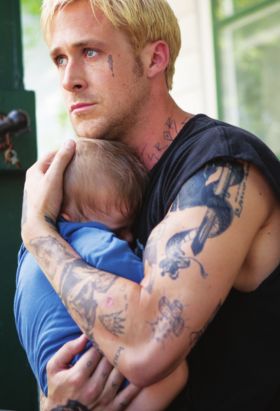Pines a haunting look at the sins of two fathers
FILM | Chuck Koplinski
There’s no question that writer/director Derek Cianfrance’s The Place Beyond the Pines, is an ambitious film, the sort of work that intelligent filmgoers long to see. It tackles profound themes in an intelligent and artful way. He sets out to make a masterpiece with this Modern Greek tragedy and he nearly succeeds. This tale about the sins of two fathers that are visited upon their sons is an engrossing and compelling film that steadily earns the emotional investment that many viewers will gladly give over. Unfortunately, the movie stumbles badly during its third act, wrapping up its emotionally tangled narrative effectively enough though it fails to deliver the knockout punch it promises early on.
Divided into three different stories, the first focuses on Luke (Ryan Gosling), a motorcycle stuntman who earns his living with a traveling carnival. While passing through Schenectady, N.Y., he’s reunited with Romina (Eva Mendes), a one-night stand from a year before, only to find out that their brief affair has led to the birth of his son Jason. With little education and few opportunities, Luke resorts to robbing banks in an effort to support his newfound family and win Romina away from her boyfriend Kofi (Mahershala Ali). However, one of his heists goes horribly wrong and he crosses paths with rookie police officer Avery Cross (Bradley Cooper), an event that irreparably changes both of their lives. The film’s second story deals with the cop’s recovery from this incident, while the third jumps ahead 15 years where we meet Cross’ troubled teenage son AJ (Emory Cohen) and the grown Jason (Dane DeHaan) who become quick friends, unaware of the nature of their fathers’ past.
On paper, this seems more than a bit contrived but Cianfrance weaves a sense of inevitability about the story that makes these events seem ordained rather than manufactured. Credit must be given to Mike Patton, whose haunting music effectively underscores the sense of dread that steadily festers from the very beginning. Even more important is the pace Cianfrance adapts to tell his story. Relentless but unhurried, the film effortlessly unspools, never rushing any of its key moments yet propelled by a sense of inevitability that’s far more effective than the ponderous pace he used in his overrated 2010 feature Blue Valentine.
Gosling continues to be one of film’s most intriguing actors. He seemingly goes out of his way here to sully his sex-symbol image. He has no problem embracing less-than likable characters and his Luke proves to be one of his more effective turns. The ignorance that hobbles him and the desperation that propels him makes for an ugly man the actor brings to life with great skill. Cooper is his equal and is perhaps the most intriguing young actor working in films today. He has been slowly and effectively distancing himself from the comic persona that made him a star in The Hangover and he continues to stretch himself, subtly uncovering the emotional turmoil Cross is wrestling with.
These two are so good that once they leave the spotlight, you can feel some of the wind go out of the film’s sails. This is one of the problems that haunt the third act but what makes it a less-thansatisfying conclusion is that in the end, Cianfrance lacks the nerve to usher the story to its appropriate conclusion. Instead of delivering an emotional gut punch, he lets his characters and the viewers off the hook, settling instead on delivering a cautionary tale about how split-second acts and seemingly innocuous actions can have a profound effect on the future rather than a tragedy that would resonate long after the end credits roll.
Contact Chuck Koplinski at [email protected].